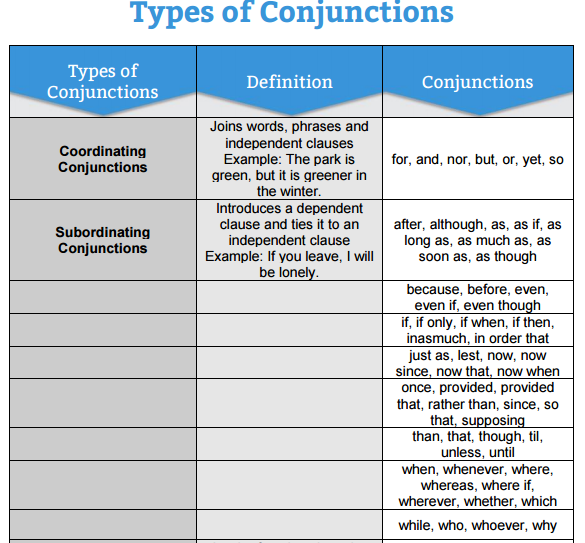I. Definition
Conjunction- a word used to connect clauses or sentences or to coordinate words in the same clause
II. Types of Conjunctions
Source: http://www.yourdictionary.com/index.php/pdf/articles/149.conjunctionschart.pdf
III. Sample Sentence
| Conjunction | Sentence |
|---|---|
| although | Although he's very famous he is still nice. |
| and | I like tea and coffee. |
| as | As I came she was leaving. |
| As you couldn't see the film, we'll tell you something about it. | |
| because | She goes to the tennis club because she likes to play tennis. |
| but | He reads magazines, but he doesn't like to read books. |
| either | I'm sorry, Peter is ill and I can't come either. |
| We can either go to the cinema or to the café. | |
| even | She likes swimming, even in winter. |
| even if | Don't drink any alcohol even if you drive carefully. |
| even though | This book is very popular; even though, I don't like it. |
| how | Do you know how to ride a snowboard? |
| however | However we've lost the match. |
| They worked hard for the test, however, they failed. | |
| if | If they were older, they could go to the party. |
| in case | Take your mobile with you in case you miss the bus. |
| in spite of | He looks very fit in spite of his age. |
| neither | They didn't go to the party, and neither did I. |
| Neither drinks nor food are allowed in this room. | |
| or | Do you like tea or coffee? |
| otherwise | Look at the map, please. Otherwise you'll get lost. |
| since | Since he's lost his money, he couldn't go to the restaurant. |
| unless | Her baby cannot fall asleep unless she stays in the room. |
| what | I don't know what to say. |
| when | When you're in London, write an e-mail to me. |
| whether | I'm going home whether you like it or not. |
IV. Activity
IV. A
Subordinating Conjunction Exercises
Complete each sentence using the subordinating conjunction from the parenthesis:
source: http://www.gingersoftware.com/content/grammar-rules/conjunctions/conjunction-exercises/
IV. B.
Coordinating Conjunction
Choices: And, but, or, so

Source: http://web2.uvcs.uvic.ca/elc/studyzone/330/grammar/coconj1.htm
IV. C.
Correlative Conjunction
Correlative Conjunctions Exercises
The following exercises will help you gain greater understanding about how correlative conjunctions work. Choose the best answer to complete each sentence.
Source: http://www.gingersoftware.com/content/grammar-rules/conjunctions/correlative-conjunctions/


